- Home
- Leo Tolstoy
Android Karenina Page 6
Android Karenina Read online
Page 6
“I told you I did not know whether I should be here long,” Levin began, “that it depended on you…”
She dropped her head lower and lower, not knowing herself what answer she should make to what was coming.
“That it depended on you,” he repeated. “I meant to say… I meant to say… I came for this… to be my wife!” he brought out, not knowing what he was saying. Levin felt that the most terrible thing was said; he stopped short and looked at her.
Kitty was breathing heavily, not looking at him. She was feeling ecstasy. Her soul was flooded with happiness. She had never anticipated that the utterance of love would produce such a powerful effect on her. But it lasted only an instant. She remembered Vronsky. She lifted her clear, truthful eyes, and seeing his desperate face, she answered hastily:
“That cannot be… forgive me.”
A moment ago, and how close she had been to him, of what importance in his life! And how aloof and remote from him she had become now!
“It was bound to be so,” he said, not looking at her. He flicked Socrates back on, and man and machine bowed together, preparing to retreat.
CHAPTER 12
BUT AT THAT VERY MOMENT the princess came in. There was a look of horror on her face when she saw them alone, and their disturbed faces. Levin bowed to her, and said nothing. Kitty did not speak nor lift her eyes. Thank God, she has refused him, thought the mother, and her face lighted up with the habitual smile with which she greeted her guests on Thursdays. She sat down and began questioning Levin about his life operating the groznium mine. He sat down again, waiting for other visitors to arrive, so he might retreat unnoticed.
Five minutes later there came in a friend of Kitty’s, married the preceding winter, Countess Nordston.
She was a thin, sallow, sickly, and nervous woman, with brilliant black eyes, and a short, green, cheap-looking Class III called Courtesana. Countess Nordston was fond of Kitty, and her affection for her showed itself, as the affection of married women for girls always does, in the desire to make a match for Kitty after her own ideal of married happiness; she wanted her to marry Vronsky. Levin she had often met at the Shcherbatskys’ early in the winter, and she had always disliked him.
“Well, Kitty,” she began. “Were you badly hurt in the attack upon the skate-maze?”
And she began talking to Kitty. Awkward as it was for Levin to withdraw now, it would still have been easier for him to perpetrate this awkwardness than to remain all the evening and see Kitty, who glanced at him now and then and avoided his eyes.
But as he was preparing to leave, he saw the officer who came in behind the countess.
“That must be Vronsky,” murmured Levin to Socrates, who nodded glumly. To be sure of it, Levin glanced at Kitty. She had already had time to look at Vronsky, and looked round at Levin. And simply from the look in her eyes, which grew unconsciously brighter, Levin knew that she loved that man, knew it as surely as if she had told him so in words. But what sort of a man was he? Now, whether for good or for ill, Levin could not choose but remain; he must find out what the man was like whom she loved.
Levin studied Vronsky. There are people who, on meeting a successful rival, no matter in what, are at once disposed to turn their backs on everything good in him, and to see only what is bad. There are people, on the other hand, who desire above all to find in that lucky rival the qualities by which he has outstripped them, and seek with a throbbing ache at heart only what is good. Levin belonged to the second class. But he had no difficulty in finding what was good and attractive in Vronsky. It was apparent at the first glance. Vronsky was a squarely built, dark man, not very tall, with a good-humored, handsome, and exceedingly calm and resolute face. His belt line was marked by two large smoker holsters; the electric crackle of a hot-whip laced around his upper thigh, a coiled cord of restrained power, waiting only for the flick of the master’s thumb to snap to life, whereupon it would pour upward into the air, crackling with deadly potential. Vronsky’s Class III, like all those awarded to border officers, was a simulative animal, in this case, one built in the shape of a powerful, silver-trimmed black wolf. Everything about Count Vronsky’s face and figure, from his short-cropped black hair and freshly shaven chin down to his loosely fitting, brand-new uniform, was simple and at the same time elegant. Making way for the lady who had come in, Vronsky went up to the princess and then to Kitty.
As he approached her, his beautiful eyes shone with a specially tender light, and with a faint, happy, and modestly triumphant smile (so it seemed to Levin), bowing carefully and respectfully over her, he held out his small broad hand to her.
Greeting and saying a few words to everyone, he sat down without once glancing at Levin, who had never taken his eyes off him.
“Let me introduce you,” said the princess, indicating Levin. “Konstantin Dmitrich Levin, Count Alexei Kirillovich Vronsky.”
Vronsky got up and, looking cordially at Levin, shook hands with him.
“I believe I was to have dined with you this winter,” he said, smiling his simple and open smile, “but you had unexpectedly left for the country.”
“Konstantin Dmitrich despises and hates the town and us townspeople,” said Countess Nordston.
Levin hoped again to make a graceful exit from the Shcherbatskys’ drawing room, and he rose and nodded meaningfully to Socrates, who gathered up his master’s coat from the II/Footman/74 of the household. In the next moment, however, they were trapped by Countess Nordston’s sudden announcement of a most tedious exercise.
The countess, much to Levin’s annoyance, had long been a fervent believer in a race of extraterrestrial beings called the Honored Guests; members of this faith had created over several decades an elaborate xenotheology, which held at its core that the Honored Guests were for now merely a watchful benevolent presence, but one day they would arrive to bless the human race with their munificence.
“They will come for us,” intoned Countess Nordston, invoking the central creed of the faith. “In three ways they will come for us.” Tonight, the countess declared, due to the sudden and furious electrical storm raging outside, was an excellent evening to provoke a brief and healing contact with one of these benevolent light-beings, through an elaborate ceremony.
“Before we begin,” Countess Nordston continued. “I must know if the psychic energy of our shared space is primed for the arrival of the Honored Guests.” Courtesana then rotated her head unit three times, and beeped accusingly at Levin and Socrates. “Konstantin Dmitrich, do you believe in it?” Countess Nordston asked Levin.
“Why do you ask me? You know what I shall say.”
“But I want to hear your opinion.”
“My opinion,” answered Levin, “is only that this alien-communing simply proves that educated society-so called-is no higher than the peasants. They believe in the evil eye, and in witchcraft and omens, while we stand in drawing rooms making circles with our hands raised, chanting obscurely, every time a lightning storm happens to raise the level of electricity in the air.”
“Oh, then you don’t believe in it?”
“I can’t believe in it, Countess.”
“But if I’ve seen them myself?”
“The peasant women, too, tell us they have seen goblins.”
“Then you think I tell a lie?”
“Oh, no, Masha, Konstantin Dmitrich said he could not believe in it,” said Kitty, blushing for Levin. Levin saw this, and, still more exasperated, would have answered, but Vronsky with his bright, frank smile rushed to the support of the conversation, which was threatening to become disagreeable.
“You do not admit the conceivability at all?” he queried. “But why not? We admit the existence of groznium, a wondrous alloy unimagined before the time of Tsar Ivan. Why should there not be some new beings, still unknown to us, which…”
“When groznium was discovered,” Levin countered hotly, “it was found, after careful experimentation over many years, to hold all those useful qualiti
es originally claimed of it by its champions. Far from being the stuff of parlor games and hopeful acolytes, it has revolutionized every sphere of Russian life!”
Vronsky listened attentively to Levin, as he always did listen, obviously interested in his words.
“Yes, but the xenotheologists such as the Countess only say we don’t know at present what these beings are, only that such beings do exist,” he argued mildly, “And these are the conditions in which they might appear to us.”
As if to reinforce Vronsky’s point, the sky just then began to rumble with thunder, and a bolt of lightning leapt forth from the clouds outside the Shcherbatskys’ big front window.
“Let the scientific men find out what these aliens might be,” Vronsky continued. “No, I don’t see why there should not be a new race somewhere in the universe, if we found a new metal…”
“Why, because with groznium,” Levin interrupted again, “all the promises of its potential have been proven! It has allowed for every positive change in our society! Every easeful thing, every moment of leisure we enjoy thanks to the helpful machines that do such work for us-all this we owe to groznium: the Grav, the transports, the robots-!” He gestured with energy at the ring of quiet and attentive Class IIIs, who stood in a respectful semicircle at the outskirts of the room.
But the conversation had ended, and the ceremony, so nonsensical to Levin, began. It took more than an hour of chanting and elaborate prayers before the ceremony was concluded-abruptly, and to Levin’s secret pleasure-when Countess Nordston threw open the parlor window to urge the Honored Guests to be swift in blessing us with their presence, but all that entered the Shcherbatskys’ magnificent front room was rain.
CHAPTER 13
VRONSKY SAT UP that night, viewing Memories in the monitor of his Class III, which was located in a smooth, furless patch of the animal’s exterior, where the “soft underbelly” of a real Canis lupus would be found.
Alexei Kirillovich had never had a real home life. His mother had been in her youth a brilliant society woman, who had had during her married life, and still more afterward, many love affairs notorious in the whole fashionable world. His father he scarcely remembered, and he had been educated in the Regimental Underschool, where he was assigned and instructed in his special military issue Class III, soon growing to cherish the ersatz hunting wolf with its thick collar of bristling metal “fur” and menacing voice-box growl.
Leaving the school very young as a brilliant officer, after a distinguished six-month tour along the border, Vronsky had at once gotten into the circle of wealthy Petersburg army men. Although he did go more or less into Petersburg society, his love affairs had always hitherto been outside it. In Moscow he had for the first time felt, after his luxurious and coarse life at Petersburg, all the charm of intimacy with a sweet and innocent girl of his own rank, who cared for him. It never even entered his head that there could be any harm in his relations with Kitty. At the floats he danced principally with her. He was a constant visitor at their house. He talked to her as people commonly do talk in society-all sorts of nonsense, but nonsense to which he could not help attaching a special meaning in her case. Although he said nothing to her that he could not have said before everybody, he felt that she was becoming more and more dependent upon him, and the more he felt this, the better he liked it, and the more tender was his feeling for her. He did not know that his mode of behavior in relation to Kitty had a definite character, that of courting young girls with no intention of ever marrying, and that such courting is one of the evil actions common among brilliant young men such as he was. It seemed to him that he was the first who had discovered this pleasure, and he was enjoying his discovery.
If he could have put himself at the point of view of the family and have heard that Kitty would be unhappy if he did not marry her, he would have been greatly astonished, and would not have believed it. He could not believe that what gave such great and delicate pleasure to him, and above all to her, could be wrong. Still less could he have believed that he ought to marry.
Marriage had never presented itself to him as a possibility. He not only disliked family life, but the very idea of starting a family was, in accordance with the general views in the bachelor world in which he lived, as alien and ridiculous as the so-called Honored Guests so fervently awaited by Countess Nordstron and her set.
Lupo finished the Memory and, before cuing the next one, chased a I/Mouse/9 across the floor. The beasts had recently become decommed, and Vronsky had begged a box of them from his friend Stepan Arkadyich, in the Ministry, as a source of amusement and exercise for Lupo. The fierce animal machine, having caught the unfortunate little Class I in his jaws and efficiently cracked its groznium spine, rolled again onto his back to reveal his monitor and the next Memory.
Vronsky felt on coming away from the Shcherbatskys’ that the secret spiritual bond which existed between him and Kitty had grown so much stronger that evening that some step must be taken. But what step could and ought to be taken, he could not imagine.
“What is so exquisite,” he mused to Lupo, “is that not a word has been said by me or by her, but we understand each other so well in this unseen language of looks and tones, that this evening more clearly than ever she told me she loves me. And how secretly, simply, and most of all, how trustfully! I feel myself better, purer, like I have exited Earth’s atmosphere, and am moon-bound. I feel that I have a heart, and that there is a great deal of good in me. Those sweet, loving eyes! When she said: ‘Indeed I do…’”
He trailed off, whereupon Lupo tilted his head and barked inquiringly.
“Well, what then? Oh, nothing. It’s good for me, and good for her.” And he began wondering where to finish the evening.
He passed in review the places he might go to. “The Blasting Club? A game of Flickerfly champagne with Ignatov? No, I’m not going. Château des Fleurs; there I shall find Oblonsky, songs, the cancan. No, I’m sick of it. That’s why I like the Shcherbatskys’, because I’m growing… better.” Instead of going out, he ordered supper, and then undressed, and as soon as his head touched the pillow and he felt the reassuring weight of Lupo’s warm, gently thrumming metal snout curled against his chest, he fell into a sound sleep.
CHAPTER 14
NEXT DAY AT ELEVEN o’clock in the morning Vronsky drove to the station of the Petersburg-Moscow Grav to meet his mother, and the first person he came across on the great flight of steps was Oblonsky, who was expecting his sister by the same train.
“Ah! Your Excellency!” cried Oblonsky. “Whom are you meeting?”
“My mother,” Vronsky responded, smiling, as everyone did who met Oblonsky and his funny little Class III. “She is to be here from Petersburg today.” Vronsky shook hands with Stiva, patted Small Stiva amiably on his hemispheric head-dome, and together they all ascended, Lupo prowling along at the rear, nose down, examining the steps with his keen scent sensors as they went.
“I was looking out for you till two o’clock last night. Where did you go after the Shcherbatskys’?”
“Home,” answered Vronsky. “I must own I felt so content yesterday after the Shcherbatskys’ that I didn’t care to go anywhere.”
“I know a gallant steed by tokens sure,
And by his eyes I know a youth in love,”
declaimed Stepan Arkadyich, just as he had done before to Levin.
Vronsky smiled with a look that seemed to say that he did not deny it, but he promptly changed the subject.
“Look there: Our tireless protectors are out in force today. I hope there are not koschei along the lines. Mother so hates to be discomfited.”
Even as he spoke, the distinct heavy thud of the 77s in their metal boots echoed through the station. Dozens of the elite bots, bulbed heads performing their endless all-seeing rotations, roamed through all corners of the vast terminus, magnifying sensors clipped to their end-effectors, searching for the monstrous little bugs known and feared as koschei
“And whom a
re you meeting?” Vronsky asked of Oblonsky.
“I? I’ve come to meet a pretty woman,” said Oblonsky, and maintained a sly, elusive expression, even as he raised his arms in the air to allow a 77 swiftly to scan his entire body. Even members of the nobility, when traveling by rail, had to submit to this relative indignity, and Oblonsky took it, like most all inconveniences, with ease and good humor.
“A pretty woman?” Vronsky replied meanwhile. “You don’t say so!”
“Honi soit qui mal y pense! My sister Anna.”
“Ah! That’s Madame Karenina,” said Vronsky. The 77 leveled his physiometer at Count Vronsky, who, with an officious scowl, whistled to the accompanying Caretaker and directed the man’s attention to a small pin he wore on his lapel, identifying him as an officer of the Border Regiments.
“If you need assistance, I am here,” he with quiet arrogance to the gold-uniformed soldier, who, mollified, gestured curtly to the 77 and departed.
“You know my sister Anna, no doubt?” Stepan Arkadyich was saying as together they approached the platform.
“I think I do. Or perhaps not… I really am not sure,” Vronsky answered heedlessly, with a vague recollection of something stiff and tedious evoked by the name Karenina.
“But Alexei Alexandrovich, my celebrated brother-in-law, you surely must know. All the world knows him. He is in the Higher Branches.”
“Ah, yes,” said Vronsky. “And… he is, enhanced, yes?”
Oblonsky nodded with mock gravity. “Oh, that he most certainly is.”
“I know him by reputation and by sight,” Vronsky continued. “I know that he’s clever, learned, religious somewhat… But you know that’s not… not in my line” said Vronsky in English.
“Yes, he’s a very remarkable man; rather a conservative, but a splendid man,” observed Stepan Arkadyich, “a splendid man.”
A chorus of shrill beeps erupted from the center of the station, as a dozen of the bioscanners rang out as one. The 77s and their Caretaker converged around a fat peasant with a battered rucksack, who stood wide-eyed and trembling as one of the massive machine-men snaked a winding, pincer-tipped cord from a slot on his lower-mid-torso and plucked a tiny koschei from the pocket of his vest.

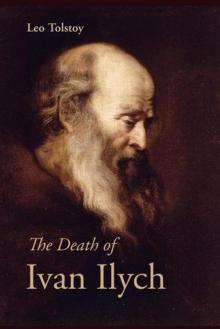 The Death of Ivan Ilych
The Death of Ivan Ilych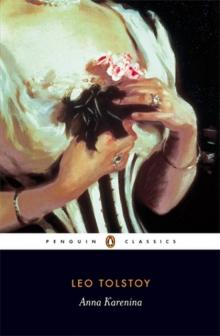 Anna Karenina
Anna Karenina Resurrection
Resurrection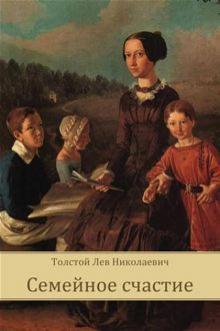 Family Happiness
Family Happiness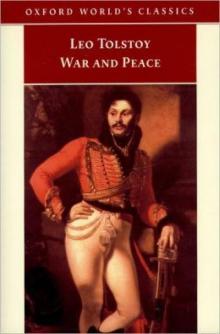 War and Peace
War and Peace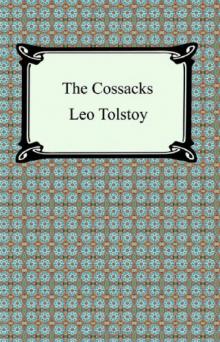 The Cossacks
The Cossacks The Kreutzer Sonata
The Kreutzer Sonata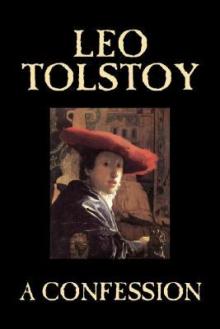 A Confession
A Confession The Kingdom of God Is Within You
The Kingdom of God Is Within You Father Sergius
Father Sergius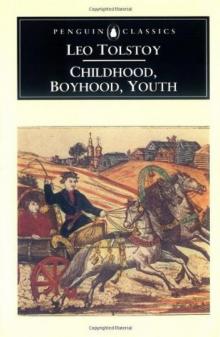 Childhood, Boyhood, Youth
Childhood, Boyhood, Youth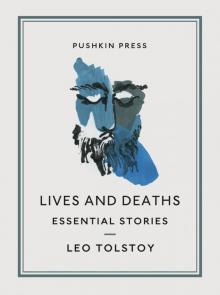 Lives and Deaths
Lives and Deaths The Devil
The Devil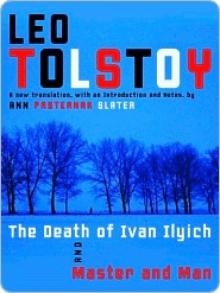 The Death of Ivan Ilyich and Master and Man
The Death of Ivan Ilyich and Master and Man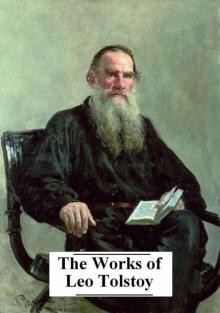 The Complete Works of Leo Tolstoy (25+ Works with active table of contents)
The Complete Works of Leo Tolstoy (25+ Works with active table of contents)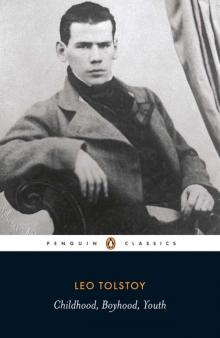 Childhood, Boyhood, Youth (Penguin ed.)
Childhood, Boyhood, Youth (Penguin ed.)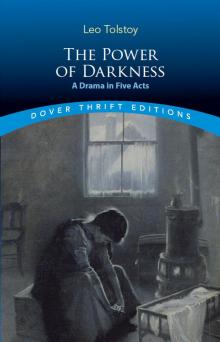 The Power of Darkness
The Power of Darkness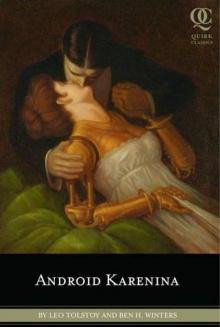 Android Karenina
Android Karenina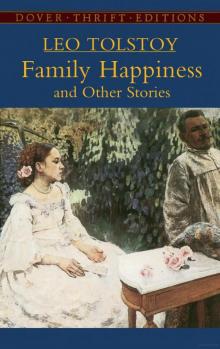 Family Happiness and Other Stories
Family Happiness and Other Stories The Lion and the Puppy
The Lion and the Puppy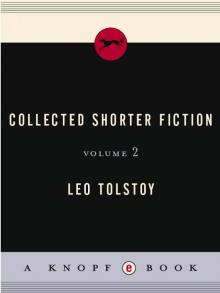 Collected Shorter Fiction, Volume 2
Collected Shorter Fiction, Volume 2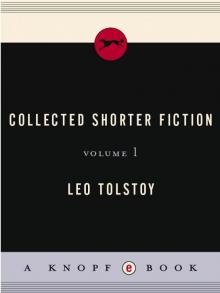 Collected Shorter Fiction, Volume 1
Collected Shorter Fiction, Volume 1